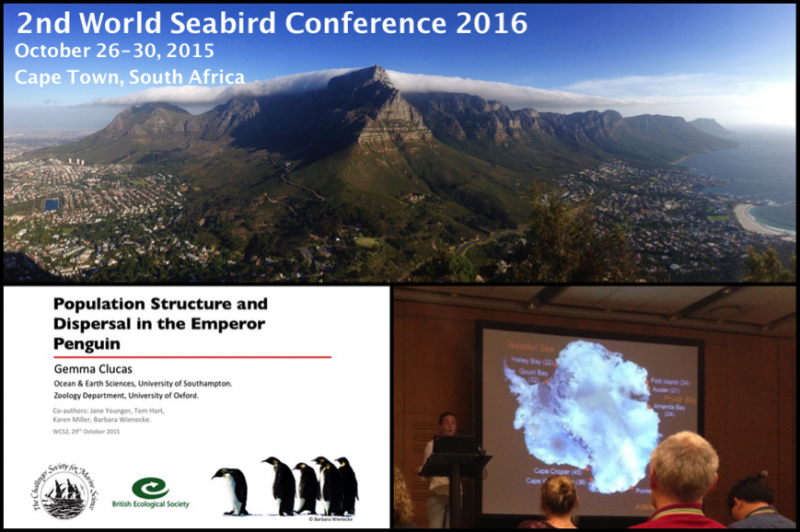World Seabird Conference 2015: Cape Town
Gemma Clucas
Univeristy of Southampton and University of Oxford

A Challenger Society Travel Award allowed me to attend the World Seabird Conference in Cape Town in October 2015. The conference is only held every five years, and so it brings together seabird ecologists from all over the world. This year, nearly 600 delegates from 42 countries attended the four-day conference, and a third of the delegates were students, which gave it a very open and accessible atmosphere. The conference organisers had also done a great job of mixing the right amount of presentations and poster sessions with a good number of fun social events, such as the speedy seabird social, which was like speed dating but for networking scientists. This meant that there were many great opportunities for meeting people, which will hopefully lead to future collaborations.
On the second-to-last day of the conference I presented some of my PhD research in a short presentation entitled, “Population Structure and Dispersal in Emperor Penguins.” This included the results of a population genomic study I have been conducting on Emperor penguins from eight colonies around Antarctica.
After my talk I had some interesting discussions with population modelers who are trying to predict how climate change will affect emperor penguins using global climate change projections. If I can quantify exactly how much migration occurs in Emperor penguins using genomic techniques, then this could feed directly into population models to increase the accuracy of their predictions, which would be a really exciting outcome.
Overall the conference was a really worthwhile and interesting event for me to attend and I would like to thank the Challenger Society for their support.
Profile
I am a 3rd year PhD student working on the population genetics of penguins around Antarctica. I am based partly at the University of Southampton and partly at the University of Oxford, working with Dr. Tom Hart and Dr. Gareth Dyke. My work focuses on identifying the processes that cause populations to become genetically differentiated from one another, and how this leads to speciation.
Twitter Post
Thanks @challengersoc for helping me get to #WSC2. Great fun and brilliant presenting my research to such a relevant audience.
Latest News
Marine Data Management, Governance and the MEDIN toolset
The Marine Environmental Data and Information Network (MEDIN) and OceanWise are delighted to invite you to attend our popular free online training workshop: ‘Marine Data Management, Governance and the MEDIN toolset’ on the 19th – 23rd of May 2025.
Workshop on the contribution of UK Arctic Ocean science to the International Polar Year 32/33
12:00 11th June – 16:00 12th June 2025: NOC Southampton (In-person with online option): Registration deadline 16th May
REGISTER HERE
Pre-meeting questionnaire (open to all)
The purpose of this workshop is for the UK Ocean Science community to discuss and then draft a prospectus document outlining the priority Arctic research questions the community would like to address during the run up to, throughout and beyond the International Polar Year 32/33. Additionally, to identify what unique strengths and technologies the UK has to help fill these knowledge gaps.
The second day of the workshop will be dedicated to writing groups, one for each of the priority research questions identified - from both the pre-meeting questionnaire (HERE) and day one discussion. By the end of the meeting, each group will have produced draft text and sourced supporting figures for the prospectus.
Post meeting, the draft will be opened for comments and suggestions from everyone, regardless of whether they were able to attend the workshop or not. It will then be shared with UK funders (UKRI, FCDO, DSIT, ARIA) and potential international programmes with whom we would like to collaborate (e.g. Arctic 2050, Norway). It will form a basis from which wider integration with terrestrial, atmospheric and cryosphere communities can be built, e.g. at the UK Arctic Science Meeting in September in Northumbria.
To ensure balanced community and ECR representation, and to ensure that the size of the writing groups is efficient and effective, if the number of registrations from individual institutes becomes overwhelming, we may contact individuals or teams and ask that each institute selects a smaller number of individuals to attend in-person. Please wait for confirmation of in-person attendance before finalising travel arrangements.
The workshop will be open to hybrid attendance and contributions on both days.
Challenger Society Council Position Vacancy
The Challenger Society for Marine Science (CSMS) are pleased to announce an exciting opportunity to support the next generation of ocean scientists and innovators. CSMS are looking for a new Council member to fill the Student Travel Awards and Stepping Stones Portfolio. The successful applicant will administer the travel and research grants available for Early Career Researchers.
The role involves:
- Receiving applications for the two schemes and responding to applicant inquiries
- Soliciting and compiling input from the rest of the Council for assessing the applications
- Communicating with successful and unsuccessful applicants for the two schemes
- Working with the Honorary Treasurer on allocating funds to successful applicants
- Following up with award winners on their reporting requirements
- Attending Council meetings four times a year (in person or online) and contributing to discussions and decision making for CSMS
The usual term for Council members is three years.
For more information about the CSMS Council, please follow this link: https://www.challenger-society.org.uk/The_Council
For more information about our Early Career Researcher grants and awards, please follow this link:
https://www.challenger-society.org.uk/Stepping_Stones
and
https://www.challenger-society.org.uk/Travel_awards
If you are interested in applying or have any questions regarding the role, please contact kathen@bas.ac.uk
